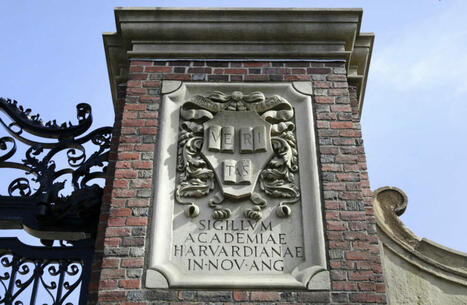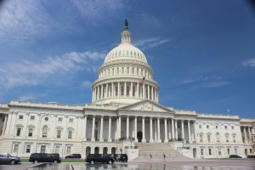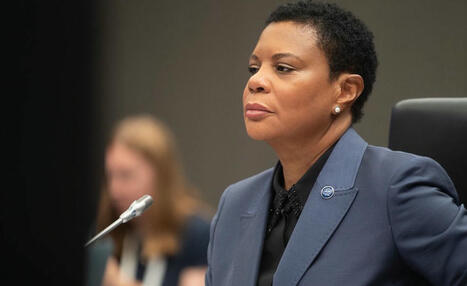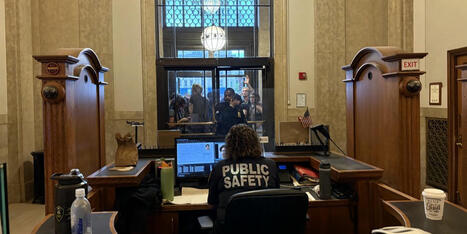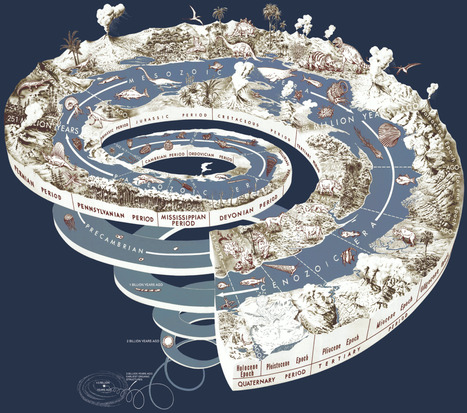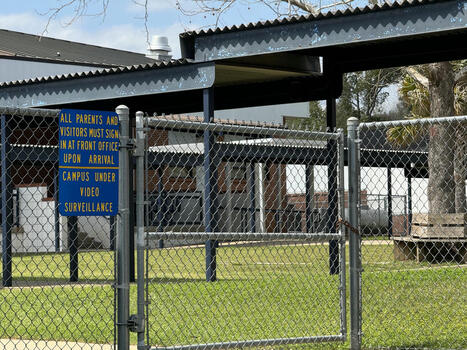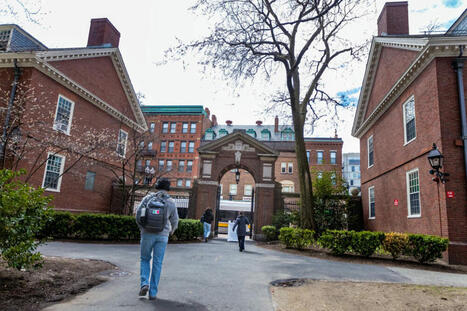 Your new post is loading...
 Your new post is loading...
Hayden, who became the first woman and the first African American to serve as the Librarian of Congress when she was appointed in 2016, was abruptly fired via email late Thursday.
Kent Greenfield is a professor of law at Boston College Law School. His final lecture of the semester is usually an upbeat summation and send-off, but not this year.
A Republican overhaul would reduce borrowers' repayments options from several plans to just two.
Harvard University responded Monday to recent threats from the Education Department to halt its grant funding, highlighting reforms it was undertaking but warning it won't budge on “its core, legally-protected principles” over fears of retaliation.
The U.S. Senate voted to kill the decision of the FCC to use the Universal Service Fund to fund WiFi hotspots for students and libraries. The House is supposed to take up the issue soon. The FCC approved this funding in 2024 under FCC Chairperson Jessica Rosenworcel. The plan was to use the E-Rate funding…
Texas is now the second state to pass a bill that would require Google and Apple to verify users' ages and then block minors under 18 from downloading apps without parental permission.
“I open the case that they are stored in, and...it's this whole experience. You smell the aged books, and then you touch their smooth leather covers that have worn down because they've been held by thousands of citizens of Franklin before you...They're like this little family. I open the case and visit my little family. They're really special.”
Quilting, the act of joining multiple patches or scraps and layers of fabric together, is used to describe patterning, storytelling, data collection and analysis, and worldbuilding. Maude Southwell Wahlman, Eli Leon, and others describe the aesthetic preferences of traditional Black American quilt makers, which include strip-construction, multiple, flexible and bold patterning, asymmetry, and improvisation. Sherri Lynn Wood compares quilt making to jazz musical scores. Researchers (Savage & Lynch 2025; Tolliver 2024) discuss quilting as a “fluid iteration of artful inquiry that allows (people) to flow within, through, and beyond the research process.” In my book, I discuss quilting as a form of remixing: "The semi-symmetry in African weaving and African American quilt making are achieved by the juxtaposition of distinct geometric motifs and by controlled variations in texture, scale, shape, orientation, or color." — Nettrice Gaskins, Techno-Vernacular Creativity & Innovation, p. 68 Quilting is both a noun and a verb, which shows various ways that practice, research, or ritual can be used to ‘piece’ data or information together.
We could be saying goodbye to long-planned space missions, new weather satellites, and crucial life-saving treatments.
An algorithm is a plan for solving a problem represented as a simple step-by-step description. Many people put algorithms within the boundaries of computer science but there are algorithmic patterns in M.C. Escher’s artworks or in patchwork quilts from Gee’s Bend, Alabama, which contain elements of West African textile patterns. Code is the implementation of an algorithm in a specific language or vernacular. Secret or hidden codes, such as the symbols that were sewn into quilts along the Underground Railroad, are used to protect important information by converting it into a disguised form that only members could decipher. This includes Ring Shout and the Cypher in hip hop culture. Ring Shout is the earliest form of resistance that Black Americans embraced. It is a dance and ritual that was developed away from the continent of Africa, but created by the descendants of African people, with significant African influences. I’ll return to this topic later… The song’s pattern is A-B-A-B-A... — James Snead The first time I saw black music written as an algorithm was in an essay written by late Yale scholar and professor James Arthur Snead (see above). Though he only lived until the age of 35, he left behind several published works. After his death, Cornel West called him “among the most important American intellectuals in the late 20th century.” A little over a decade ago I read Snead’s “Repetition as a figure of black culture” that examines how cultures grapple with algorithmic patterns in the form of repetition. You can hear repetition in the blues, as well as in rap music. It’s foundational to Black creative expression and culture. Black culture, like many cultures, engages in various forms of “coverage” or “cover-up” to maintain its identity, and the key is in the algorithm. The source of Black algorithmic creativity and expression (repetition) is the Deep South.
A Turkish Tufts University student says her asthma attacks continue to worsen since she was taken into custody, arguing ahead of her latest court hearing that her health has suffered while being held in crowded conditions.
A legislative committee is reviewing several proposals that would limit or ban personal phone usage in schools, including the so-called STUDY act, backed by Attorney General Andrea Campbell earlier this year.
As one of the leading primetime anchors for the 24-hour news network MSNBC, Rachel Maddow needs little introduction to most Americans who concern themselves even occasionally with current events. Of course, within the extremely polarized world of contemporary US politics, Maddow has no shortage of devoted viewers and aggressive detractors. To those unfamiliar with her, or the news organization to which she is so closely associated, it is safe to say that she sits decidedly within the progressive left wing of American politics. While international readers may find Maddow’s latest full-length book, Prequel: An American Fight Against Fascism, to be a relatively straight-forward account of historical non-fiction (incredible as the idea of a fascist movement in America may be), there is little doubt that the US domestic audience will approach this book with preconceived notions of the author and her intent. It is only on the very last page and a half, however, that the underlying impetus of this book—and its conspicuously suggestive title—is explicitly addressed. The word “Prequel”—as a story that chronologically prefigures another to which it is directly related—refers in this case to the organized far-right groups of individuals who attempted an insurrection at the US Capitol building on 6 January 2021. Thus, while the book is all but exclusively concerned with events that took place in the 1930s and 1940s, the title unflinchingly looks to the present.
|
"I cannot participate in systems that require dishonesty as the price of belonging." --Alondra Nelson Today, I am resigning from the National Science Board and the Library of Congress Scholars Council. Even as the White House threatens the foundational tenets of constitutional democracy and continues to slash funding for essential social services, it is tempting to hope that the public institutions charged with promoting and protecting knowledge will, nevertheless, soldier on with their mission. I did. Since January 2025, scientists and librarians, program officers and policy analysts at the National Science Foundation, the Library of Congress, and other federal offices and agencies have focused on their work, despite an increasingly hostile political environment. We’ve also seen civil servants fired and accused of not making the mark, vendors’s contracts ignored, and grants and fellowships cancelled.
DOGE staffers tried to assign a team to the independent Corporation for Public Broadcasting after President Trump's purported firing of three board members last month.
President Donald Trump’s first 100 days brought about significant changes to higher education. Explore the consequences.
The administration is using immigration enforcement as a guise to mask its plans to decimate vital research and academic freedom.
Students at Butler Library during Wednesday’s Gaza protest faced harsh consequences, though several had their suspensions lifted days later.
Barnard College lifted the interim suspensions Friday morning of three student journalists who covered a Wednesday pro-Palestinian protest, citing “additional review and investigation,” according to emails obtained by the Columbia Spectator.
Teachers often have trouble finding enough time in the school day to teach all the expected writing skills, let alone cursive handwriting.
Based on evidence of human activity in the Earth’s record, archeologists are helping to define the Anthropocene as a new stage in the geological record.
Florida’s sheriffs asked for legislative clarification of a “clunky” 2024 school-safety law. Lawmakers responded, sending classroom door-locking revisions through both chambers. Last summer, Polk County Sheriff Grady Judge espressed concern that law enforcement officers might unintentionally violate state laws designed to lock out threatening people. “You know, we passed this legislation last year, and it’s […]
A large part of the natural beauty of the South is the silver garland that hangs from our live oak trees. Spanish moss-draped oaks are the consummate image
The action was laid out in a letter to Harvard’s president and amounts to a major escalation of Trump’s battle with the Ivy League school.
Public school funding could take a hit if the US Supreme Court opens the door to religious charter schools, a scholar of education law argues.
|






 Your new post is loading...
Your new post is loading...



